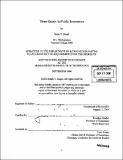Three essays in public economics
Author(s)
Siegel, Sarah Y
DownloadFull printable version (7.932Mb)
Alternative title
3 essays in public economics
Other Contributors
Massachusetts Institute of Technology. Dept. of Economics.
Advisor
Jonathan Gruber.
Terms of use
Metadata
Show full item recordAbstract
This thesis consists of three separate papers. In the first paper, using the Panel Study of Income Dynamics (PSID), which has measures of both risk preferences and religiosity along with measures of many risky behaviors, I investigate the implications of the correlations among risk preferences, religiosity and gender for the observed relationship of each of these variables with risky behaviors. I conclude that the correlations of risk preferences, religiosity, and gender with behaviors are all strongly robust to including the others in the regression; although they are correlated, they have independent relationships with risky behaviors. The second paper reports the results of a randomized field experiment to study the impact of choice in charitable giving; in this experiment half of the recipients of a newsletter from a Dutch NGO were able to choose what program area their donation would be spent on. There is no difference in either mean response rates or mean donation amounts between the treatment and control groups; I thus conclude that while most of the treatment group in this experiment did not value the choice that they were given, the choice also did not make them any less likely to donate. (cont.) In the third paper, a coauthor and I develop a computer model in which individual agents choose a neighborhood based on preferences over the area's racial composition; this model of residential segregation is loosely based on the 1971 Schelling model. We find that both the strength of preferences for diversity, and historical segregation, have strong effects on equilibrium levels of integration. When we include contemporary discrimination in our model, however, we find that it increases segregation in an initially unsegregated model, but has no additional effect on segregation in an initially segregated model. Finally, we examine a simple social policy that encourages integration, and find that it is successful in creating diversity, making diversity-seeking agents better off.
Description
Thesis (Ph. D.)--Massachusetts Institute of Technology, Dept. of Economics, 2006. Includes bibliographical references.
Date issued
2006Department
Massachusetts Institute of Technology. Department of EconomicsPublisher
Massachusetts Institute of Technology
Keywords
Economics.